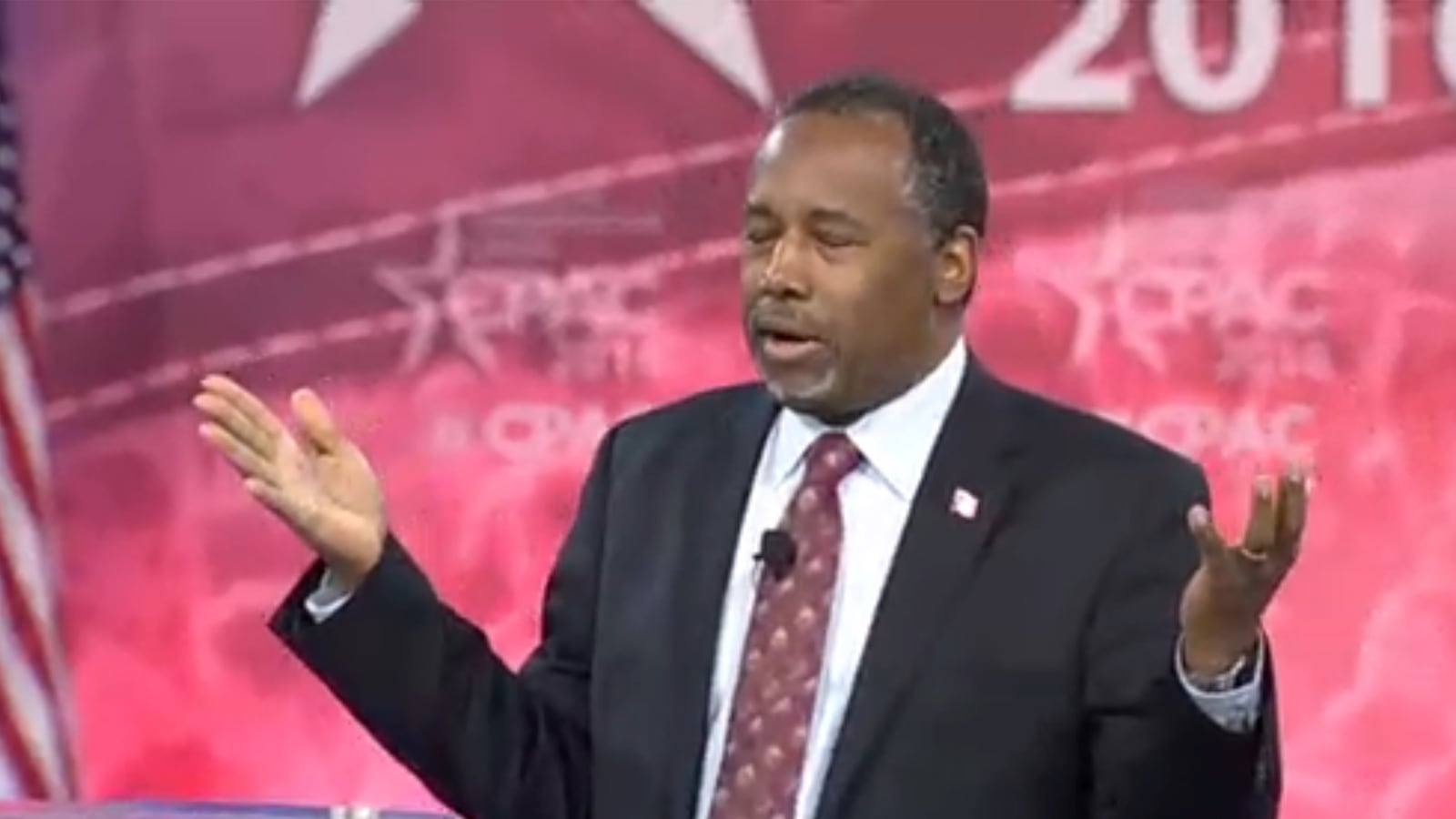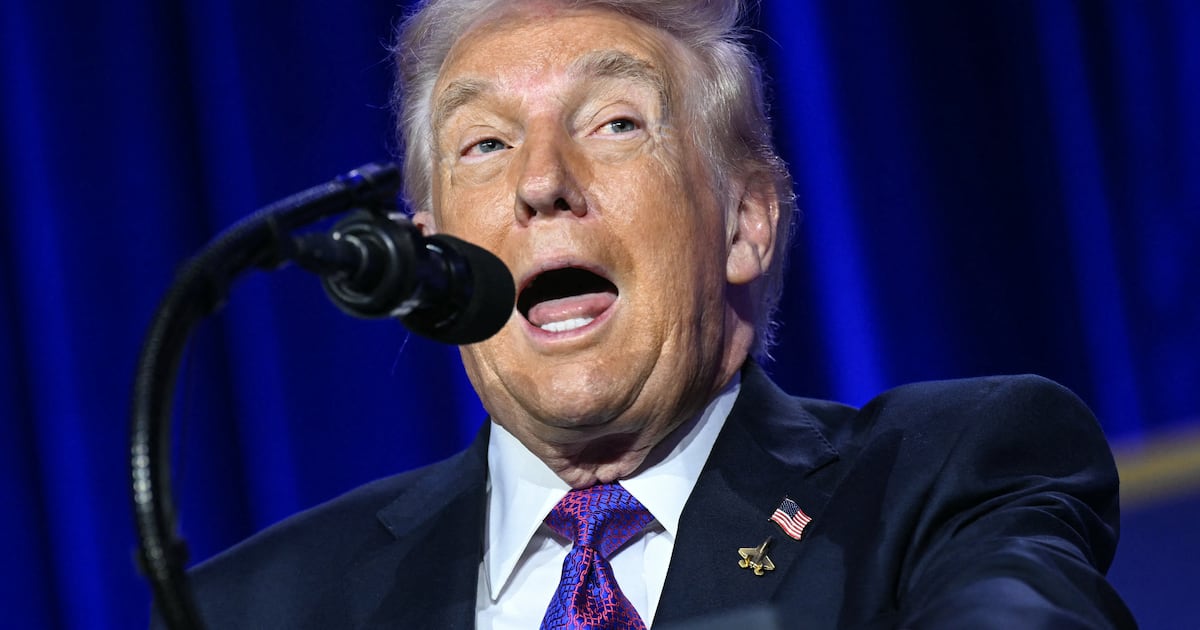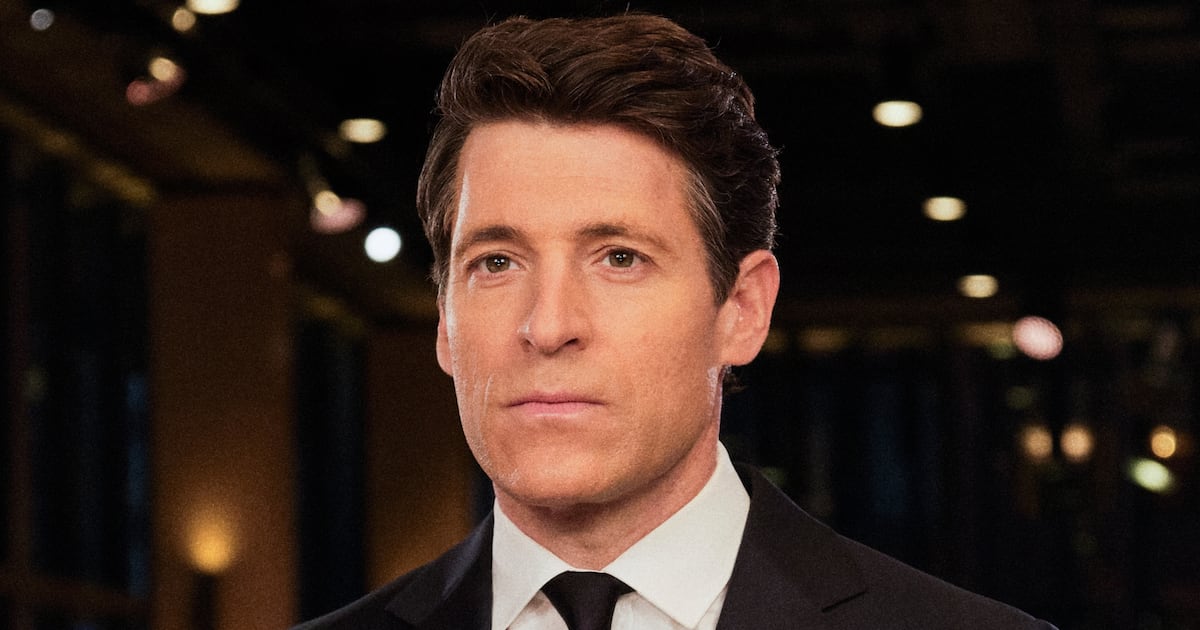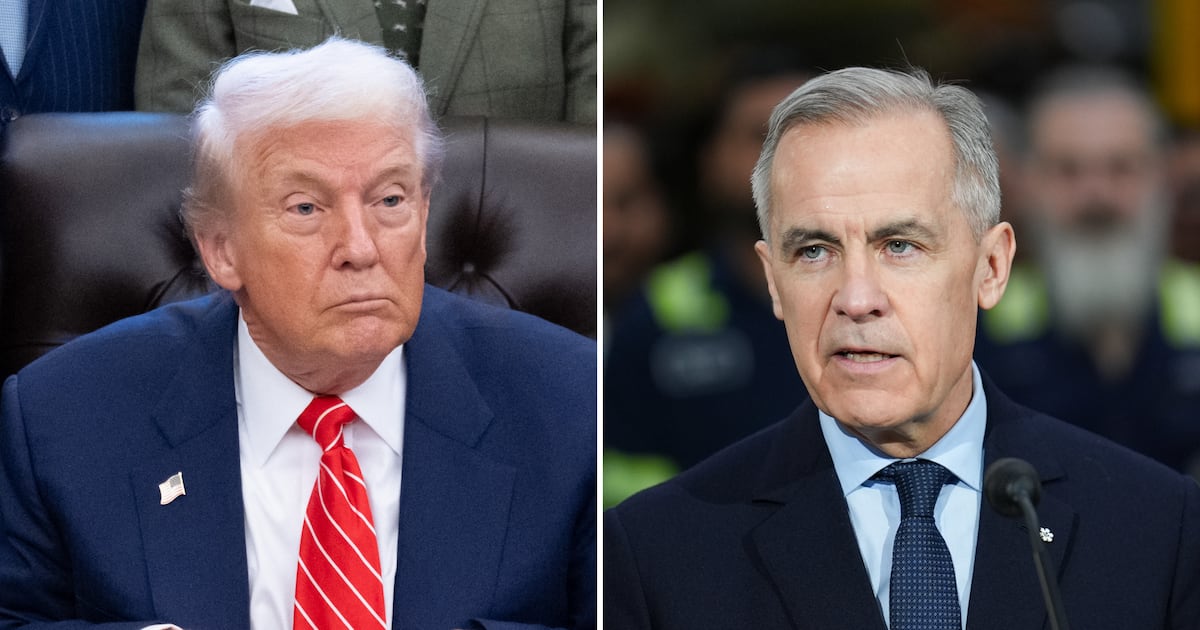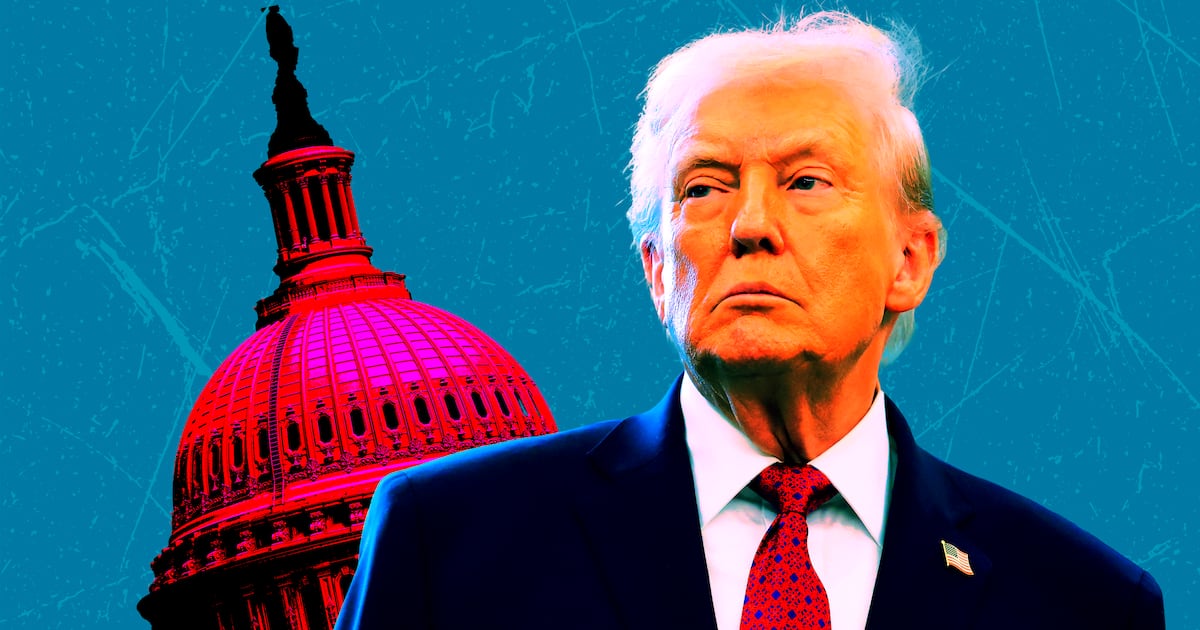Ben Carson was the dumbest smart person running for candidate.
The former neurosurgeon, who stood out as an oddity in an already extremely bizarre presidential election, has finally let go of a campaign that quickly faded into oblivion.
Carson announced his decision during an address Friday afternoon at the Conservative Political Action Conference, after he told supporters that he saw “no path forward” for his campaign prior to Thursday night’s Republican debate. He is reported set to announce that he will serve as the national chairman for a nonpartisan organization called My Faith Votes, which hopes to compel Christians to go to the polls. His campaign has not confirmed this with The Daily Beast.
“It’s an experience I’ll never forget,” Carson said of his failed bid. “Now that I am leaving the campaign trail,” he added more explicitly later to a big applause.
Carson’s remaining staffers, a ragtag skeleton crew that has shifted seemingly on a biweekly basis, were preparing for the end as early as Feb. 26, when Carson’s newest communications director Larry Ross sent a biblical message to his staffers.
“Similar to the message Moses gave the people of Israel right before they crossed the Red Sea into freedom, Dr. Carson is proclaiming a message of freedom to our country, which is in great need,” read the message obtained by The Daily Beast. “To heal, inspire and revive America, we must move forward with courage and trust in God, without compromise or fear:”
It went on to quote the book of Exodus, seemingly relating Carson’s status in a political contest to the struggle of Moses leading the Jews out of Egypt.
“Moses answered the people, ‘Do not be afraid. Stand firm and you will see the deliverance the Lord will bring you today. The Egyptians you see today you will never see again. The Lord will fight for you; you need only to be still,’” went the passage.
Sources in Carson’s camp have indicated to The Daily Beast that he won’t endorse another candidate from the stage in National Harbor, Maryland, about an hour drive from the retired doctor’s home in Baltimore.
But an endorsement is in the works nonetheless and it’s coming down to a choice between the politically advantageous option of Donald Trump and the Washington, D.C.-pleasing Marco Rubio.
Carson, who has a home in West Palm Beach, Florida, near Trump’s golden-hued ode to his ego Mar-a-Lago, plays golf with the former reality television star. His former campaign manager, Barry Bennett, advises Trump’s campaign, after he made a much-ballyhooed exit on New Year’s Eve last year. And Armstrong Williams, the puppetmaster behind Carson’s rise and fall as a presidential prospect, has already indicated that he thinks the straw-haired mogul is going to be the nominee.
There has been push back to this plan, however, within Carson’s camp and it may stem from the desire to see him fill some role in future Florida politics—whether it be filling Marco Rubio’s upcoming vacant Senate seat or shooting for a bigger target: the governor’s mansion. An endorsement of Rubio, which some in the Carson camp are pushing for, could help him curry favor for a political future in the Sunshine State.
One thing is absolutely certain.
Carson would sooner stab himself in his own belt than endorse Ted Cruz, with whom he’s had an ugly relationship since the Iowa caucus, culminating in a leaked secret meeting in a storage closet in South Carolina.
Why would a narcoleptic failed presidential candidate be such a sought after political asset? Money and resources.
While Carson’s campaign operated as a quasi-direct mail ripoff machine, spending more money on consultants than actual campaigning, he also accumulated legions of fans and the information of some 700,000 donors. That could come in handy for the highest bidder hoping to beef up the coffers before a general election contest.
And of course, it would keep him politically relevant and poised to continue peddling his books, without further damaging an already soiled legacy.
Carson was a masterful neurosurgeon. His skill and rags-to-riches story made him an international sensation and got him a book deal with a Cuba Gooding Jr.-starred movie to boot. His foray into politics was nearly happenstance beginning with a much-lauded National Prayer Breakfast address in 2013, which put him on the map to conservatives as an African-American antithesis to the black president in office. Just over two years later, he found himself announcing a presidential bid in his hometown of Detroit, throwing him to the wolves of an election cycle dominated by anger and loud voices.
And Carson doesn’t raise his voice. In debates and in conversation, he is quiet and contemplative, making eye contact in a way that suggests he’s studying a research subject as opposed to speaking with another human. There’s a sense of distance in his eyes that belies the gears turning behind them.
His campaign was an internal power struggle from Day One. Former communications manager Doug Watts and Bennett tried to wrest control from Williams, who frequently subverted their efforts in order to favorably position himself in the limelight. Williams would schedule interviews without consent from the rest of the team. He would get on the phone with reporters on one line with Carson simultaneously on the other. Getting information from Carson’s campaign was like playing telephone with cans tethered across a freeway overpass. It was noisy, weird, and often hard to comprehend.
Carson was the outsider before Trump, the grownup in the room who was going to tell those Washington elites what’s what.
It was a strategy that went well for a while, culminating in a shocking rise in the polls in November, when Carson was actually able to eclipse Trump’s overwhelming lead. But as soon as he became the perceived frontrunner, Carson crashed in a spectacular way.
He has hindered by a combination of three things, all cascading down upon him at the same time. One was Trump’s obvious assault on anyone who managed to beat him in the polls. The current GOP frontrunner resorted to describing Carson’s pathological anger as similar to the pathology of a child molester.
And then there was the terrorist attacks in Paris, an international nightmare that changed the scope of the entire campaign going forward.
Voters saw the war-mongering red-faced screaming of Trump as a safer option than Carson’s bumbling contemplation. The campaign saw a way out of this mire by sending Carson to a Syrian refugee camp, a trip that was supposed to be a secret until Williams leaked it to The New York Times. Even then, with a gift basket of an opportunity to make Carson seem more knowledgeable than his foreign policy positions would suggest—the main one being that the Chinese were in Syria—it somehow got bungled. He ended up saying that Syrians were basically fine where they were and went right back to the business of sinking a campaign. The third and final nail in the coffin for Carson were the questions about his biography, which resulted in a news cycle where he adamantly tried to convince people that he tried to kill someone with a knife.
This all landed around the same time, effectively helping to make the summer of Trump, the fall and winter of this country’s discontent.
Carson was not great on the defensive either. Not when it came to the knife. Not when it came to him allegedly being held up at Popeye’s. Not when he was called out for promoting the scam glyconutrient company Mannatech as a cure-all for cancer. Just to name a few.
What he didn’t seem to understand, as he blamed the press for picking apart every detail of his past, was that his biographical story was his campaign. Carson had no legislative record or political history. As he frequently reminded people, he was not a politician. All he had was the mythic legend of his discovery of Christ and the redemption he sought which led him to his success. As soon as that visage started to crack, Carson could no longer be the favorite of white evangelicals who feverishly bought his books and looked to his gifted hands for the grace of God.
He became imperfect; just an ego-driven political opportunist with a portrait of himself next to Jesus in his house.
Carson’s campaign was over before the first votes in Iowa were even cast.
It was a sinking ship that managed to turn left every time it was steered right. And now, there are no more staff cuts that could save it. There are no more foreign trips to be scheduled. There are no more autobiographical falsehoods to be discovered.
There’s only Ben Carson, the rest of his money, and his gifted hands.

